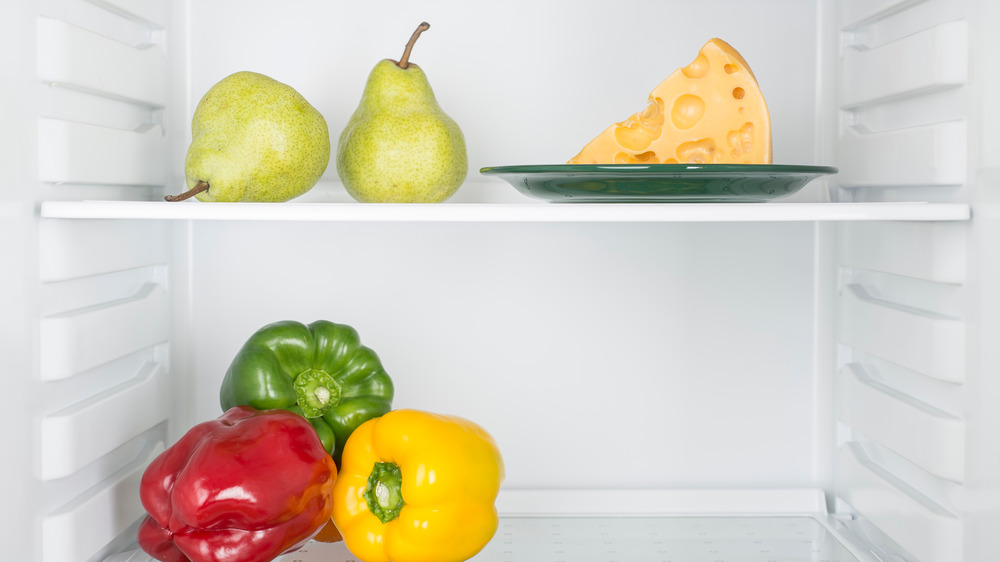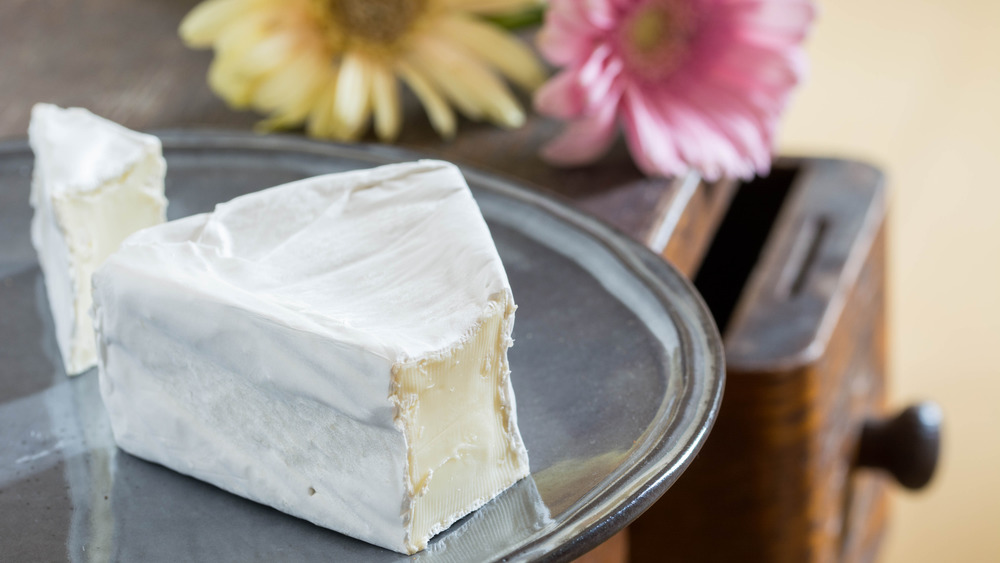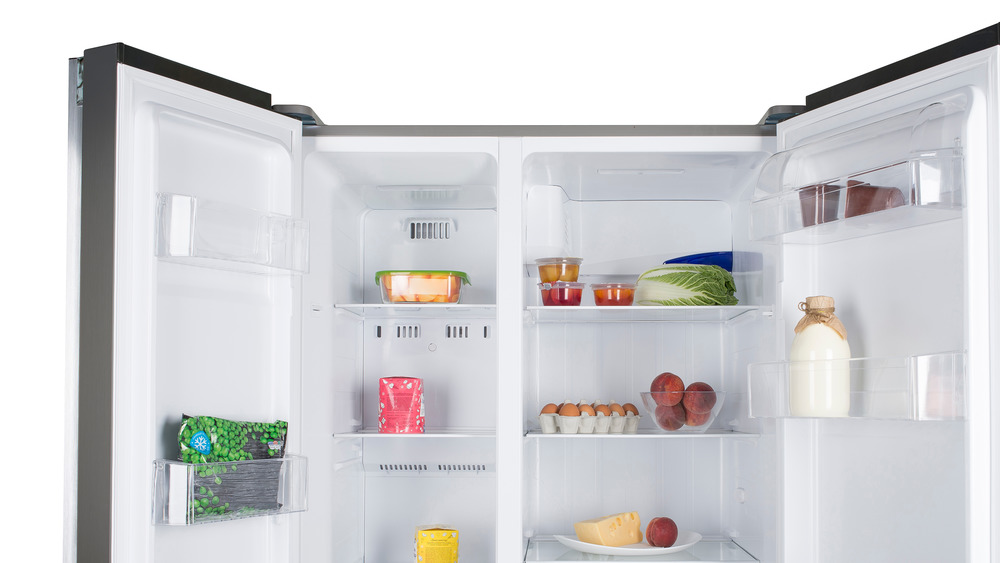This Is How You Should Be Storing Your Cheese
Cheese is a classic favorite food that's much beloved worldwide. Whether they love hard cheeses like parmesan, soft, spreadable goat cheese, or a square of snackable cheddar – everyone wants their favorite cheese to maintain a delicious, fresh flavor for as long as possible.
Of course, cheese is perishable, and that means it can't last forever before becoming unsafe for consumption. However, the length of time cheese does last depends on how it's treated, beginning from the moment it leaves the store. How the cheese is opened, how it's wrapped after that first cut, and even how it's stored until the next time you dig in for a slice are all factors in how long you can keep enjoying cheese after bringing it home.
Cheese brings so much pleasure to so many, and it's an important component in dishes ranging from quesadillas and pizza to homemade mac and cheese and classic sandwiches. But there's nothing more disappointing than when your snacking and meal go-to gets moldy, stinky, or dried out. Like anything else, it's important to give that cheese the consideration it gives you and treat it well. Read on for some expert advice on how to do just that.
Store cheese in the coldest part of your fridge
It might seem like once cheese is safely refrigerated, it's in good hands. However, while it's true that cheese should be refrigerated, how and where it's stored in that fridge makes a big difference.
Ultimately, the rule of thumb cheese experts go by is to store cheese in the coldest part of the refrigerator. This should be "between 35 to 45 degrees Fahrenheit and away from the freezer," Jill Allen, Director of Product Excellence at Tillamook and an American Cheese Society Certified Cheese Professional, told Mashed.
Cheese or crisper drawers also work well, as those drawers are made to have stable cold temperatures, according to Portland Food and Drink. And not only do you want to keep your cheese cold, you'll also want to be sure not to dry it out, so you can enjoy it longer. To sum it up, you want your cheese to have consistent temperature and humidity to keep it from spoiling faster or getting dull.
Double-wrap your cheese to store it after opening
It's probably pretty well-established that an opened package of cheese can't be just thrown in that fridge naked and that it needs to be wrapped. But how it's wrapped actually does matter a great deal.
Cheese paper or parchment paper is a really good way to go here. "Wrap first in parchment paper or beeswax reusable paper, which allows the cheese to breathe, and then again in plastic wrap or tin foil, which protects the cheese from other food aromas, yeast or spores," Jill Allen, Director of Product Excellence at Tillamook and an American Cheese Society Certified Cheese Professional, said to Mashed.
And make sure the cheese stays covered — that means every bit of it! Cheese loses flavor and moisture when it's exposed to air, experts say.
"We suggest wrapping hard cheeses, such as parmesan, in tightly drawn plastic wrap. Store soft or fresh cheeses, such as mozzarella and burrata, in clean, airtight containers, and keep semi-hard cheeses, like cheddar and gouda, wrapped in plastic wrap, cheese paper, or parchment paper," Adam Brock, Dairy Farmers of Wisconsin Director of Food Safety, Quality and Regulatory Compliance, told Mashed.
Clean your fridge if you want your cheese to last
This may seem obvious, but the best way to maintain a cheese's fresh taste is to make sure there's nothing stinky and moldy around it. In other words, make sure to regularly clean out that fridge if you want your cheese to stay fresh.
"A fridge with other moldy foods can release additional spores into the air, affecting the cheese flavor negatively," Jill Allen, Director of Product Excellence at Tillamook and an American Cheese Society Certified Cheese Professional, told Mashed.
Of course, the cheese itself could be what's stinking up that fridge. Ultimately, smell and sight will go a long way when deciding if it's too late and it's time for that brie to go bye-bye.
"Your smell and sight are the best way to determine if a cheese is no longer good to enjoy. If you see unwanted moisture or if the cheese is very dry (you should see visible cracks) or if it smells strange like ammonia, it's time to throw it away," Dave Newman, Master Cheesemaker for Castello and Arla Foods, told Mashed.
Don't store cheese in the same plastic you purchased it in
It may seem obvious to keep cheese in the same wrapping the cheesemonger originally put it in. If a cheese expert did that, it must be the right way to go, right? Well, once you bring it home, that's no longer the case, experts say.
Once you've opened up the cheese, that original packaging is no longer going to provide the same cheese security, according to Jill Allen, Director of Product Excellence at Tillamook and an American Cheese Society Certified Cheese Professional. "Blocks of cheese are usually vacuum packaged by the manufacturer; once that vacuum seal is broken and the cheese is exposed to air, there is an increased risk of mold growth and oxidation," Allen told Mashed.
So, keep cheese in that original wrapping until you open it up, and then, once you do open the packaging, follow the double-wrapping advice earlier in this story.
Different cheeses have different storage needs
Not all cheese is the same, and different cheeses have different requirements as to how they need to be cared for. As a basic rule of thumb, the less solid the cheese is, the quicker you should use it and the less you should fool around with the storage options.
Harder cheeses should be tightly wrapped in plastic wrap, Patrick Kenny, co-owner of Saisonnier, a family-run beer and cheese bar and shop in Kinderhook, New York in the Hudson Valley, told Mashed. This should involve the wrap being smooth against the face of the cheese in order to maintain a solid barrier. Softer cheeses, like brie, will fare best when wrapped in parchment paper and then in plastic wrap or specially designed cheese paper, advised Kenny.
Just like you wouldn't use hard and soft cheese interchangeably in cooking or baking, the same is true for storage. Makes sense!
Don't leave cheese out of the fridge for too long
Generally, there are few issues when it comes to storing cheese, all of which can impact the quality and could become a concern when considering food safety (though that can depend on the cheese and how long it's left out). Once you're done cooking, snacking or wrapping up your party, make sure to put the cheese back in the refrigerator and don't allow it to sit out on the counter overnight.
"Leaving cheese out overnight may impact the quality of the product, but would not, in most cases, result in a food safety issue," Adam Brock, Dairy Farmers of Wisconsin Director of Food Safety, Quality and Regulatory Compliance, told Mashed.
There is always the potential risk of pathogens or mold, but the risk can depend on how the cheese is manufactured, experts say. "Cheeses that have been aged a bit longer, such as parmesan, will be better able to maintain their unique flavor and functionality characteristics and are less of a food safety risk even when held outside of ideal conditions," said Brock.
Don't store cheese in the freezer
It seems like an obvious solution to maintaining cheese would be to throw it in the freezer — that makes everything stay fresh longer, right? Well, not everything. Cheese can be frozen, technically, but it just won't be quite the same if you do, and in that case, is there truly a point in bothering?
"It will change the texture and taste of the cheese," Jill Allen, Director of Product Excellence at Tillamook and an American Cheese Society Certified Cheese Professional, told Mashed.
However, Allen says it is okay to bake or cook with that cheese after freezing, so throw it in that big casserole of mac and cheese, for sure — but it'll no longer be cheese you want to sit and snack on its own. So, freeze if you want, but manage your expectations about the results you'll get after you do so. Cheese plates for happy hour may become a no go after the cheese has already been frozen, but a baked brie may be a great backup plan.
Separate the blue or washed rind cheeses when storing
Some cheeses play well together, but others don't. You're not going to want to keep super pungent cheeses near the other cheeses — for the same reason you'd probably not want to store your parmesan next to a big bag of garlic!
Certain families of cheeses, such as Bleu d'Auvergne or Epoisses, are particularly pungent, and if stored too close to other cheeses they can affect the taste of other, milder curds. "To store them, use the original wrapping," Charles Duque, Managing Director of the Americas division for CNIEL (the French Dairy Board) and Operations Director of the French Cheese Board in New York City, told Mashed. "Leave the container open very slightly to create air flow, but prevent it from affecting your other cheeses and put it in a refrigerator drawer."
This way, that blue cheese will be just fine to enjoy stuffed in an olive in a delicious martini later in the night, but it won't mess with the fontina you plan to cook with later.








